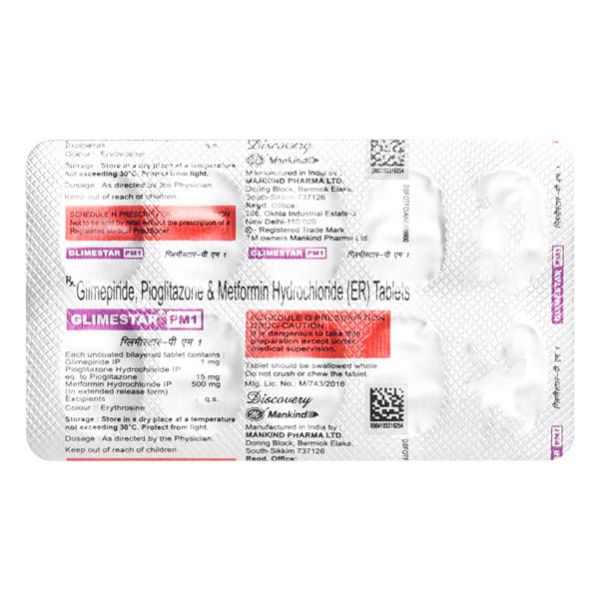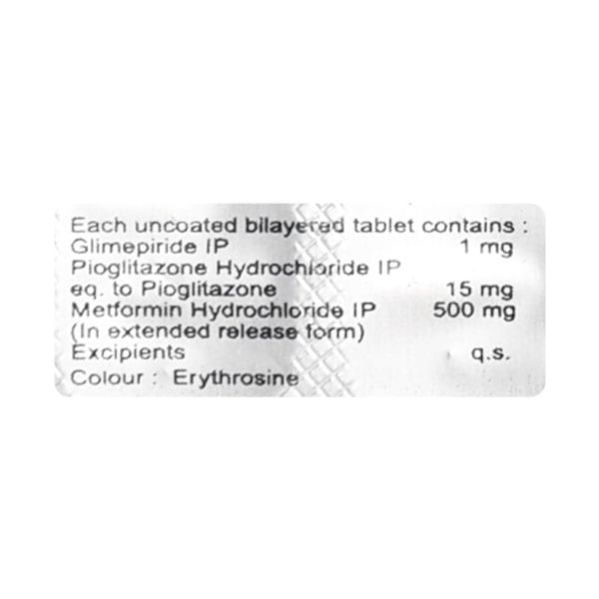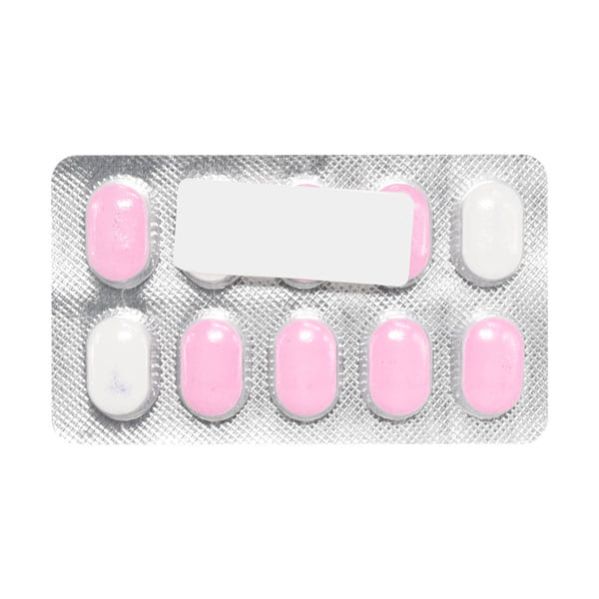Glimestar Pm1 Tablet 10'S
GLIMEPIRIDE 1MG+METFORMIN HYDROCHLORIDE 500MG+PIOGLITAZONE 15MG
₹ 98.00
₹110
(Inclusive of all taxes)
-

No Warranty
-

COD Avilable
-

Non Returnable
-

cancelable
About this item
INTRODUCTION ABOUT GLIMESTAR PM1 TABLET
GLIMESTAR PM1 TABLET is used to manage type II diabetes mellitus when diet, exercise and management with single agent does not result in adequate sugar control. It is a combination of Glimepiride, Metformin and Pioglitazone which belongs to the group of medicines called Antidiabetic agents.
Before taking GLIMESTAR PM1 TABLET, inform your doctor if you have any liver, kidney or heart problems. You must also inform your doctor if you have any eye problems, hormonal imbalance, alcoholism, or if you are malnourished, starved, on an irregular diet as a precaution. It is strictly not recommended for use in patients with type I diabetes mellitus, bladder cancer, severe heart failure or lactic acidosis.
Along with the management, follow the diet and lifestyle changes advised by your doctor to achieve better results. Avoid smoking and consumption of alcohol while taking the medicine as it may aggravate the existing condition. The most common side effects are low blood sugar levels, nausea, stomach upset, constipation, sore throat, muscle pain, headache, dizziness and weight gain. Consult your doctor if any of these side effect worsens.
USES OF GLIMESTAR PM1 TABLET
- Used to manage type II diabetes mellitus
HOW GLIMESTAR PM1 TABLET WORKS
GLIMESTAR PM1 TABLET stimulates the pancreas to secrete more insulin (a hormone involved in glucose metabolism). It also makes our body more sensitive to insulin which helps in digesting the circulating sugars (glucose) in the blood, thereby reducing blood sugar levels. Additionally, it can also reduce the glucose produced by the liver and reduces its absorption in the body.
DIRECTIONS FOR USE
- Take GLIMESTAR PM1 TABLET preferably after meals or as advised by your physician
- Swallow the medicine with a glass of water. Do not crush or chew the medicine
- Your doctor will decide the correct dose and duration of therapy for you depending upon your age, body weight and disease condition
- Do not stop taking GLIMESTAR PM1 TABLET unless your doctor advice you to stop
SIDE EFFECTS OF GLIMESTAR PM1 TABLET
Common side effects of GLIMESTAR PM1 TABLET:
- hypoglycemia (low blood sugar levels)
- diarrhea, stomach pain, loss of appetite, flatulence
- changes in taste, metallic taste
- joint pain, back pain, muscle pain
Stop taking GLIMESTAR PM1 TABLET and contact your doctor immediately if you experience any of the following side effects:
- signs of lactic acidosis (cold hands or feet, dizziness or light-headedness, slow or irregular heartbeat, weakness or tiredness, unusual muscle pain, trouble breathing, sleepiness or drowsiness, stomach pains, nausea or vomiting)
- symptoms of heart failure (such as unusual shortness of breath or trouble in breathing, rapid increase in weight or localised swelling (oedema), especially in the ankles or legs, unusual tiredness)
- signs and symptoms of bladder cancer (blood in your urine, pain while urinating or urgent need to pee)
- increased risk of fractures (especially in the bones of hand, upper arm, or foot in women)
- blurred vision due to swelling at the back of the eye or worsening of existing blurred vision
- serious allergic reaction (hives, swelling of the face, lips, tongue or throat causing difficulty in breathing or swallowing)
- signs of liver problems (nausea or vomiting, stomach pain, unusual or unexplained tiredness, loss of appetite, dark urine, yellowing of the skin or the whites of the eyes)
WARNING & PRECAUTIONS
PREGNANCY
Consult your doctorThere are no adequate human data to determine the safety of GLIMESTAR PM1 TABLET during pregnancy.
BREASTFEEDING
Consult your doctorIt is not known if GLIMESTAR PM1 TABLET passes into human milk and if it can harm your baby. Talk to your doctor about the best way to control your blood glucose levels while breastfeeding.
DRIVING AND USING MACHINES
Use with CautionDo not drive or operate any heavy tools or machines if your ability is affected by GLIMESTAR PM1 TABLET.
ALCOHOL
Consult your doctorAvoid consumption of alcohol while taking GLIMESTAR PM1 TABLET as it may increase the risk of unwanted side effects.
KIDNEY
Consult your doctorGLIMESTAR PM1 TABLET is not recommended for use in patients with severe kidney problems. It should be used with caution in patients with other kidney problems.
LIVER
Consult your doctorGLIMESTAR PM1 TABLET is not recommended for use in patients with severe liver problems. It should be used with caution in patients with other liver problems.
ALLERGY
ContraindicatedDo not take GLIMESTAR PM1 TABLET if you are allergic to Glimepiride, Metformin, Pioglitazone or to any other ingredients of this medicine.
HEART DISEASE
Consult your doctorGLIMESTAR PM1 TABLET is not recommended for use in patients with severe heart problems (such as heart failure). It should be used with caution in patients with other heart problems.
USE IN PEDIATRICS
ContraindicatedGLIMESTAR PM1 TABLET is not recommended for use in children and in adolescents (aged below 18 years).
USE IN GERIATRICS
Use with CautionGLIMESTAR PM1 TABLET should be used with caution in elderly patients (aged above 65 years).
OTHERS
It is not recommended for use if you:
- have type I diabetes mellitus (insulin dependent diabetes)
- have lactic acidosis (build-up of lactic acid in the body)
- have diabetic ketoacidosis
- have bladder cancer
- pass bloody urine
Before taking GLIMESTAR PM1 TABLET, inform your doctor if you:
- are recovering from any injury, operation, infections or from any form of stress
- have G6PD deficiency
- are on fating or malnourished, starved, on an irregular diet, or feeling weak
- perform extreme physical exercises without proper carbohydrate intake
- are severely dehydrated
- have hormonal problems
- have edema (swelling of body parts)
- smoke
- have special type of diabetic eye disease called macular oedema
- have cysts on your ovaries (polycystic ovarian syndrome)
- previously had stroke
- have anemia
- have any bone problems or at risk of developing bone fractures
- are a premenopausal woman
- have thyroid problems
INTERACTIONS
A. Drug-Drug Interactions:
Before taking GLIMESTAR PM1 TABLET, inform your doctor if you are taking any of the following medicines:
- Antidiabetics (Ex. teneligliptin, rosiglitazone, insulin, gliclazide)
- Non-steroidal anti-inflammatory agents (Ex. aspirin, ibuprofen, celecoxib, phenylbutazone, azopropazone, oxyphenbutazone)
- Antibiotics (Ex. amikacin, nitrofurantoin, sulfamethoxazole, tetracyclines, chloramphenicol, ciprofloxacin, clarithromycin, Trimethoprim)
- Antifungals (Ex. fluconazole, miconazole, isuvaconazole)
- Anticoagulants (Ex. warfarin)
- Hormone replacement therapy (Ex. testosterone)
- Antidepressants (Ex. moclobemide, isocarboxazid, phenelzine, tranylcypromine, fluoxetine, chlorpromazine, prochlorperazine, lithium)
- Anti-lipidemic agents (Ex. fenofibrate, nicotinic acid, colesevelam)
- Antihypertensives (Ex. enalapril, lisinopril, ramipril, atenolol, propranolol, telmisartan, olmesartan, clonidine, guanethidine and reserpine)
- Anti-arrhythmic agent (Ex. Disopyramide)
- Anti-gout agents (Ex. allopurinol, probenecid, sulfinpyrazone)
- Anti-cancer agents (Ex. cyclophosphamide, ifosfamide, trofosfamide, vandetanib, crizotinib and olaparib)
- Hemorrheologic agents (Ex. Pentoxifylline)
- Enzyme inhibitor (Ex. tritoqualine)
- Alpha blockers (Ex. prazosin, doxazosin)
- Hormonal replacement therapy (Ex. estradiol)
- Thiazide diuretics (Ex. hydrochlorothiazide)
- Hormones (Ex. Levothyroxine)
- Corticosteroids (Ex. prednisolone, betamethasone)
- Bronchodilators (Ex. salbutamol, terbutaline)
- Alpha- and beta-adrenergic agonists (Ex. Adrenaline)
- Laxatives (Ex. lactulose, liquid paraffin)
- Anticonvulsants (Ex. phenytoin, Fenfluramine)
- Barbiturates (Ex. phenobarbital)
- Carbonic anhydrase inhibitor (Ex. acetazolamide)
- H2 blockers (Ex. Cimetidine)
- Anti-TB agents (Ex. Rifampicin)
- HIV integrase inhibitors (Ex. Dolutegravir)
- Anti-anginal (Ex. Ranolazine)
Overdosage:
If you or anyone else accidentally took more GLIMESTAR PM1 TABLET, you may experience the signs of hypoglycemia (such as increased hunger, sweating, headache, feeling clammy, restless or aggressive, shakiness, fast heartbeat and confusion). To manage this, consume any sugary food immediately. If the symptom did not improve or worsens contact your doctor immediately. Other symptoms of overdosage might include vomiting, stomach pain with muscle cramps, feeling generally unwell with severe tiredness and difficulty in breathing.
SYNOPSIS
| Drug | : | Glimepiride, Metformin, Pioglitazone |
| Pharmacological Category | : | Sulfonylureas, Biguanides, PPAR-gamma and PPAR-alpha agonist |
| Therapeutic Indication | : | Type II diabetes mellitus |
| Dosage Forms | : | Tablet |
0 Review Of Product Glimestar Pm1 Tablet 10'S















